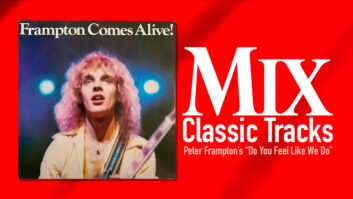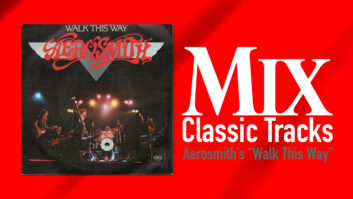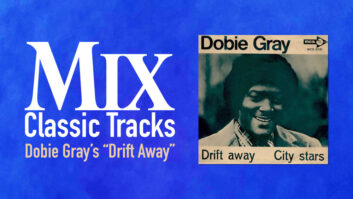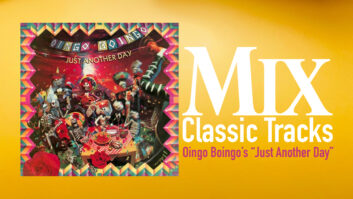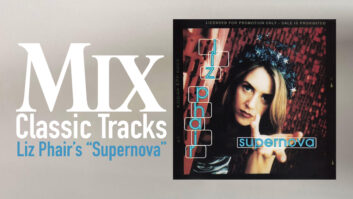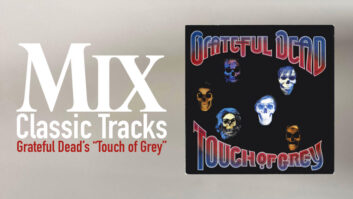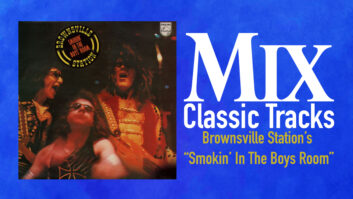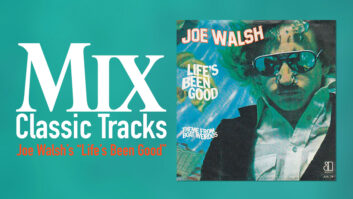What kind of a song is The Bangles’ “Walk Like an Egyptian,” anyway? More than a novelty hit and not quite an actual dance craze, it strikes the perfect balance between playful and cool, sexy and silly. While its lyrics, like those of many novelty hits, are funny and even ridiculous at times, they also carry a Utopian message of a unification of all countries through a fictional dance. Even the Soviet Union and the Japanese—the United States’ military and economic adversaries during the ’80s—are called to join.
The song is also given weight by its musical richness. Over its instantly recognizable shaker-and-drum-machine groove, The Bangles add grit with rock ‘n’ roll bass and guitars, and sweetness with deadpan pop vocals. There’s a plethora of percussive bangs and gong sounds that, while underscoring the joke-y title reference of the song, also makes it unusual and sonically adventurous. And there’s the unique lead vocal trade-off — three of The Bangles take turns singing verses and choruses. All this adds up to a song that is humorous without being campy, joyful and a touch ironic without being cynical. “There was an aspect of fun and light-heartedness, and I think ‘Egyptian’ kind of epitomizes that part of the ’80s,” says Susanna Hoffs, one of the group’s guitarists and vocalists. “It’s hard to go in and say, ‘I’m going to write a song like that.’ It was a magical thing and no one could have planned or predicted it.”
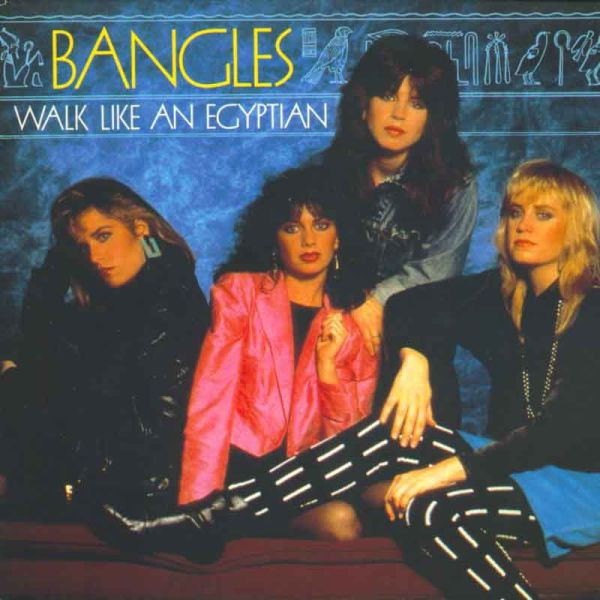
The Bangles emerged during the early ’80s as part of the “Paisley Underground,” a group of Los Angeles bands that incorporated folk-rock and psychedelic influences from the ’60s and ’70s, along with some of that era’s peace-and-love vibe. (Some say this was in explicit contrast to the violent punk scene of the time.) Echoing bands like the Beach Boys and The Byrds, The Bangles and their cohorts had a predilection for rich vocal harmonies, jangly guitars and sun-drenched West Coast pop melodies.
The Bangles also had a garage-pop aesthetic that ran through much of their first album on Columbia, All Over the Place. While it garnered critical acclaim and attention from college radio, the group had yet to break into mainstream commercial success when they began recording the follow-up, A Different Light at L.A.’s Sunset Sound Factory. “With A Different Light, in some ways we were trying to be a little more sophisticated,” says guitarist/vocalist Vicki Peterson.
A Different Light was engineered by Tchad Blake and Peggy McLeonard, and mixed by David Leonard. It was the second time The Bangles had been paired with David Kahne, a producer who had worked with such acts as Romeo Void, Rank & File and Fishbone. Kahne wryly refers to their collaboration as a “forced marriage,” though he adds, “the results are pretty good, and we’re all still healthy, walking around, so everything is okay.”
“It was not an easy process,” says Peterson of the album’s writing and recording. “Some of that was trying to work out our relationship with David Kahne, and figure out whether it was a good working relationship or not. We knew he was very talented and brilliant in his way, and made good records, so we had to weigh that against all the other issues.”
The tension between The Bangles and Kahne was evident during the selection and recording of “Walk Like an Egyptian,” a song written by an Akron, Ohio-based producer named Liam Sternberg. While Vicki Peterson remembers she liked the song’s demo that Kahne played them—“It was so out of left-field and cool”—her sister, drummer/vocalist Debbi Peterson, had strong objections, according to Kahne, because of the drum machine groove. “The Bangles were essentially a garage band,” Hoffs elaborates. “We were very much about playing things in our own primitive way as self-taught musicians. ‘Walk Like an Egyptian’ was more calculated in a certain way—and one of the main things that differentiated it was that it was created around a groove invented on a drum machine. It almost felt like: Is it gonna be Bangle-y enough? Is it gonna be cool to have this departure from what we usually do?”
Once the band agreed to Kahne’s proposal, there was the question of who would sing it as The Bangles rotated lead vocals from song to song. Debbi Peterson was initially slated to do it, but Kahne felt she couldn’t nail the part, so he began auditioning the other members of the group. “We’d never had to audition for our own songs before, so that was a little uncomfortable, I think, for everybody, including for Debbi, who didn’t make the cut, as it were, in David’s eyes,” Vicki Peterson says. “It made it feel like, whose record is this anyway? But on the other hand, all these things were happening for a reason, and it was not impossible to see that the greater good was being served for the band itself and for this record we were trying to make.” In the end, Vicki Peterson took the first verse and chorus, bassist/vocalist Michael Steele the second, and Hoffs sang the last.
Like the demo, The Bangles’ version is built around an Alesis drum machine groove. That mechanical shuffle defines the song in a way that a live drummer couldn’t capture: Vicki Peterson notes that the group continues to use programmed drums when they play the song in concert today. Also on the rhythm track are a Peruvian shaker, a trash-can lid, a gong and a bongo sound played on the pre-choruses by producer Mitchell Froom.
“Froom was across the hall, and he had a new Emulator synth, which had a bongo sample in it,” Kahne says. “That was kind of a big deal because those Emulators cost $14,000, and they had 8 megs of RAM in ’em, so it seemed [at the time] like they had this massive sample capability—you could put in a really low-level, 8-bit sample of bongo drums.”
While the song was markedly different from The Bangles’ other material, they made it irrevocably theirs when they laid down the vocals. “Part of that is having sisters in the band—the genetics work to our advantage,” Hoffs says. “If you look at the Beach Boys and other bands that have had family members singing together, there’s a really cool thing that happens. The sound of all of our voices together was unique, so that made it a Bangles song more than anything else.”
Kahne recorded the vocals of the group with his standard setup: a Neumann U47, API preamp and 1176 Blackface. “We would work out all the harmonies [ahead of time], and then when they sang them, they did it as a group,” he says. “There was no overdubbing individual people, which makes for a different kind of recording process. We would double the vocals most of the time, but they would sing together as a group, and we would get a different kind of relationship that you don’t get recording each person, even if they’re supposedly singing the same part. There are intonation things, phrasing things — like somebody might pull a little late, so it’ll make the second chorus seem a little different than the first.”
Classic Tracks: The Police’s “Every Breath You Take”
“David Kahne was a real perfectionist,” Hoffs remembers, “but I have to say, it built my chops as a singer. He didn’t do a lot of comping of vocals. He really wanted the lead vocal to be done on one track, so if there was something not working or a section that could be better, even within a line or a phrase, he would want us to punch it in. It was kind of a difficult process, but I learned a lot—I think we all did—about arrangement and, in particular, about vocal harmonies. I have a Pro Tools studio in my own house now, and the way I layer my own vocals, a lot of that I learned from David Kahne.” She also notes that The Bangles continue to record now as they did then, singing around a microphone rather than recording vocals individually.
While The Bangles and Kahne were ultimately pleased with the results of the recording, nobody expected it to become a huge hit. “Manic Monday” emerged as the album’s first single, another cover famously written for the group by Prince (under the pseudonym Christopher). That song went on to reach Number 2 on the Billboard charts, blocked from the Number One spot by Prince’s own single “Kiss.”
Vicki Peterson remembers having serious doubts that the record company would back “Egyptian” as a single at all. “It was just so left-field and odd, and there was nothing like it on the radio. When I found out they were going to release it, I thought it was hysterical and I loved it—and then it took off.” The single hit Number One in the fall of 1986 and propelled A Different Light all the way to Number 2 on the album chart in early 1987.
The Bangles had a number of strong singles after “Egyptian,” including “Eternal Flame” and the Simon & Garfunkel tune “Hazy Shade of Winter.” A few years later, the stress of constantly touring together—and other priorities, such as starting families—finally caused the group to separate. In the early 2000s, however, the group reunited, and since then they’ve toured sporadically, recorded one album and begun work on a second, this time co-produced by power-pop songwriter Matthew Sweet (who has also cut two fine albums of cover tunes with Hoffs). The Bangles have also resumed touring, though only a few times a year now in place of the hectic schedule of their major-label days. And David Kahne’s very successful producing career is still going strong, with collaborations the past few years including the likes of Paul McCartney, Regina Spektor, Kelly Clarkson and many others.
People continue to love “Egyptian,” including younger audiences. “It’s a cyclical thing of being fascinated by things that happened before you were around to experience them, just like when I was in high school in the ’70s and there were all these shows like Happy Days about things in the ’50s,” Hoffs says. “Little kids that couldn’t have possibly had access to it through the normal routes—it’s not played on Top 40 radio anymore—know about it. It’s kind of become part of the lore of that time.”
